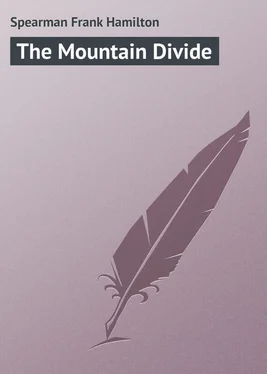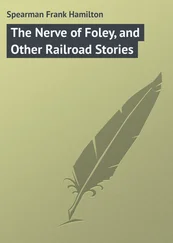Frank Spearman - The Mountain Divide
Здесь есть возможность читать онлайн «Frank Spearman - The Mountain Divide» — ознакомительный отрывок электронной книги совершенно бесплатно, а после прочтения отрывка купить полную версию. В некоторых случаях можно слушать аудио, скачать через торрент в формате fb2 и присутствует краткое содержание. Жанр: foreign_prose, foreign_adventure, на английском языке. Описание произведения, (предисловие) а так же отзывы посетителей доступны на портале библиотеки ЛибКат.
- Название:The Mountain Divide
- Автор:
- Жанр:
- Год:неизвестен
- ISBN:нет данных
- Рейтинг книги:4 / 5. Голосов: 1
-
Избранное:Добавить в избранное
- Отзывы:
-
Ваша оценка:
- 80
- 1
- 2
- 3
- 4
- 5
The Mountain Divide: краткое содержание, описание и аннотация
Предлагаем к чтению аннотацию, описание, краткое содержание или предисловие (зависит от того, что написал сам автор книги «The Mountain Divide»). Если вы не нашли необходимую информацию о книге — напишите в комментариях, мы постараемся отыскать её.
The Mountain Divide — читать онлайн ознакомительный отрывок
Ниже представлен текст книги, разбитый по страницам. Система сохранения места последней прочитанной страницы, позволяет с удобством читать онлайн бесплатно книгу «The Mountain Divide», без необходимости каждый раз заново искать на чём Вы остановились. Поставьте закладку, и сможете в любой момент перейти на страницу, на которой закончили чтение.
Интервал:
Закладка:
The young operator, who, in spite of his efforts to conceal his hurt, now limped a little as he walked up the street of the new railroad town might well look with curiosity and amazement on what he saw. The street he walked in was no more than a long assemblage of saloons, restaurants, boarding-houses, gambling-houses, dance-halls and shops. Nearer the station and fronting on the open square, there were barber-shops and so-called hotels. Up and down the side streets he saw livery-stables and roughly built warehouses for contractors’ supplies, army supplies, and stage-line depots.
The main street was alive with strange-looking frontiersmen, trappers, hunters, scouts, soldiers, settlers, railroad laborers, outlaws, prospectors, and miners. Every face that Bucks looked into presented a study. They were sometimes faces bronzed with the clear, dry sunshine of the plains and mountains, rugged with adventure and keen with dangers met and passed, but others were furrowed with dissipation and seamed with vice, or merely vacant with the curiosity of the wanderer.
Nearly every man carried a fire-arm of some sort. Indians were a continual menace upon the frontier to the north and west and on the front where the road was being built; and in the train-service and construction work railroad men usually went armed. Moreover, when the frontiersmen were not arming against the Indians they were arming against one another; it being difficult at times to tell whether the white men or the savages were the more dangerous to the peaceful pursuit of happiness. As Bucks, returning down Front Street, neared the square that opened before the station a group of army officers were walking across it. They were the first regular officers he had ever seen and he regarded them with interest. At the station the chief despatcher, Baxter, met him at the door. “Bucks, I’ve been waiting for you. Can you ride a horse?”
Bucks smiled.
“Colonel Stanley,” continued Baxter, “is going to the front to-night. He wants to take an operator with him. Giddings isn’t well enough to go, but he can take your key to-night; you can go with the colonel instead. He will take Dancing and a detail of cavalrymen with Leon Sublette and Bob Scott for guides.”
The suddenness of the call was not unpleasant. It was such continual excitement and new adventure that Bucks liked and he said he was ready. The despatcher told him to hunt up Bill Dancing, who would give him the details.
Within an hour the cavalry horses were being loaded into a box-car up at the stock chute, and while Bucks and big Bill Dancing watched them an engine and the chief engineer’s car were backed down the yard to make up the special train. At the same moment, the two saw Stanley walking across the yard with two engineers who were going to the front with him.
Bucks looked with admiration at the soldier-constructionist. He was slight in figure, wore the precise-looking military cap, and was dressed with extreme care. He stepped with a light briskness that implied an abundance of native energy, and his manner as he greeted the two railroad men was intimate and gracious, putting them at once at their ease. His smooth-shaven face, bronzed with service, and his brown eyes, were alive every moment. Whatever the enterprise, Stanley could call forth the loyalty and the best in those under him, and in Dancing and Scott he had two men that worked well together and had in their chief the unquestioning faith that insures devotion.
To these two more experienced men was now to be added a third, Bucks. The train started almost at once, and Oliver, the colonel’s cook, prepared supper in his box-like kitchen and chopped his potatoes, for frying, in muffled ragtime, as the puffing engine slowly drew the train up the long gorge into the mountains. Bucks sat down at table with the engineers and Stanley asked him many questions. He wanted to know where Bucks had gone to school, why he had quitted at fifteen, and what had brought him away out on the Desert to begin railroading.
When it appeared that Stanley as well as he himself was from Pittsburgh, and even that Bucks had been named after the distinguished officer–John Stanley Bucks–Bucks was happier than at any time since he had left home.
The talk went on till very late. Stanley and General Park, who also had been a regular-army man, told stories of the Civil War, just then ended, and the giant lineman, Dancing, entertained the company with stories of adventure incurred in the mountains and on the plains in building the first transcontinental telegraph line.
Bucks sat for hours in silence while the three men talked; but he had good ears and was a close listener. All the adventure books of his boyhood reading had been bound up with this very country and with these rugged mountains through which they were riding. The tales of the people all about him during his youth had been of the far and mysterious West–of the overland trail and the gold seekers, of Pike’s Peak and California, of buffaloes and trappers and Indians, and of the Mormons and the Great Salt Lake. These had been his day-dreams, and at last he was breathing the very air of them and listening to men who had actually lived them.
The sleeping-bunks in the car could hardly be called berths, but they served to lessen the fatigues of the night, and when Bucks woke in the morning he saw from his window a vast stretch of rough, desert country bordered by distant mountain peaks, some black, some brown, some snow-capped in the morning sun. The train stopped in a construction camp, near the end of the rails, and after a hasty breakfast Bucks walked with the engineers up the track to the head-quarters of the rail-laying gang.
The air was frosty. During the night snow had fallen, and as Bucks followed his party the sun burst over the plain that they had crossed in the night and lighted the busy camp with a flood of gold. It was a camp such as few American boys had ever seen and of a type that no boy will ever see again. Everywhere along the cuts and hillsides and in sheltered spots the men had made temporary quarters by burrowing into the clay or soft rock and making dugouts and canvas-roofed huts, with earthen sides for walls.
But not all were so enterprising as this. Some laborers were camping in old hogsheads. Even packing-boxes served others for shelter, but were all so disposed within the cuts and among the ridges of the railroad grade as to be safe from Indian forays. And along the completed railroad, all the way from the Missouri River, material and supply trains were moving to supply this noisy, helter-skelter camp, which seemed to Bucks all confusion, yet was in reality all energy.
General Jack Casement, in charge, came forward to greet Stanley.
“And they tell me, general,” said Stanley, “you are laying a mile a day.”
“If you would give us the ties, colonel,” returned Casement, short-bearded and energetic, “we should be laying two miles a day.”
“I have turned the Missouri River country upside down for timber,” returned Stanley. “The trouble is to get the material forward over a single track so many hundred miles. However, we shall be getting ties down the Spider Water within two weeks. I am on my way up there now to see what the contractors are doing.”
It was the first intimation Bucks had had as to the object of the trip. Casement had a number of subjects to lay before his superior while within consulting distance, and Bob Scott, an hour later, announced that Stanley would not move on for two days. This left his attendants free, and when Scott, low-voiced and good-natured, asked Bucks if he wanted to go out on the Sweet Grass Plains with him after an antelope, Bucks accepted eagerly. The two saddled horses and Bucks, with a rifle borrowed from Sublette, followed Scott across a low-lying range of hills broken by huge stone crags and studded with wind-blown and stunted cedars, out upon the far-reaching expanse of an open plain. The scene was inspiring, but impressions crowded so fast one upon another that the boy from the Alleghanies could realize only that he was filled with sensations of delight as his wiry buckskin clattered furiously along the faint trail that carried him and his guide to the north and west. The sun was high when Scott reined up and, dismounting, tethered his horse in a glade hidden by a grove of aspens and bade Bucks do the same.
Читать дальшеИнтервал:
Закладка:
Похожие книги на «The Mountain Divide»
Представляем Вашему вниманию похожие книги на «The Mountain Divide» списком для выбора. Мы отобрали схожую по названию и смыслу литературу в надежде предоставить читателям больше вариантов отыскать новые, интересные, ещё непрочитанные произведения.
Обсуждение, отзывы о книге «The Mountain Divide» и просто собственные мнения читателей. Оставьте ваши комментарии, напишите, что Вы думаете о произведении, его смысле или главных героях. Укажите что конкретно понравилось, а что нет, и почему Вы так считаете.












